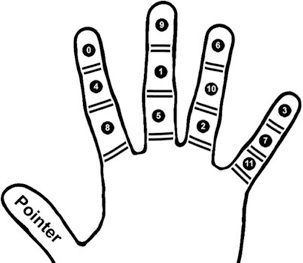Science
Related: About this forumehrenfeucht games
(139 posts)phantom power
(25,966 posts)BlueStreak
(8,377 posts)9! is 362880
pokerfan
(27,677 posts)
French Revolutionary Time: 10 hours in a day, 100 minutes in an hour, 100 seconds in an hour... If you're going to go metric, go all in.
http://io9.com/5886129/the-short-strange-history-of-decimal-time
The downside is that ten isn't evenly divisible into thirds or quarters. But we have ten fingers, so there's that....
BlueStreak
(8,377 posts)Days and years relate directly to the movement of the earth in relation to the sun, but months are a bit more arbitrary. I think it makes a lot more sense for the year to begin either on a solstice or equinox.
pokerfan
(27,677 posts)The number twelve, a highly composite number, is the smallest number with four non-trivial factors (2, 3, 4, 6), and the smallest to include as factors all four numbers (1 to 4) within the subitizing range. As a result of this increased factorability of the radix and its divisibility by a wide range of the most elemental numbers (whereas ten has only two non-trivial factors: 2 and 5, with neither 3 nor 4), duodecimal representations fit more easily than decimal ones into many common patterns, as evidenced by the higher regularity observable in the duodecimal multiplication table.
http://en.wikipedia.org/wiki/Duodecimal
BlueStreak
(8,377 posts)6 finger, 6 finger, man alive!
How'd I ever get along with five?
pokerfan
(27,677 posts)Count your phalanges! You can even use your thumb as a pointer.

muriel_volestrangler
(101,382 posts)of 29.53059 days from new moon to new moon (or full moon to full moon). You round that up to 30, and you create a calendar of 12 30 day months. You've either already worked out that the year is about 365 days, or it will become apparent after a year or two of using a 360 day year that 365 is closer. So you say "OK, a division into 12 is convenient, and 30 is close; we'll make a few months 31 days". The need for leap years becomes apparent after a few decades. The only really silly bit of our calendar is February having 28 days, normally. You could have it as 5 or 6 months of 31 days, and the rest 30.
It seems the start of the year, relative to the winter solstice, was set by Julius Caesar and his Senate in a combination of astronomy, politics, superstition and when the new moon was the year he reformed the calendar: http://www.hermetic.ch/cal_stud/cal_art.html
To really confuse things, at some times in English history, the start of the year has been taken as 25th March.
http://en.wikipedia.org/wiki/Old_Style_and_New_Style_dates
And then there's the move to the Gregorian calendar; which is responsible for the British financial year still starting not on 25th March, but April 6th; and for the October Revolution in Russia starting, as far as the West was concerned, on the 7th November ...
Dr. Strange
(25,925 posts)NutmegYankee
(16,201 posts)It needs to be sqrt(9)=3! or 6-1. Oh well.
Blappy
(84 posts)That is very similar to a clock from the triple nine society, sold at cafepress. One o'clock is slightly different, but the factorial is in the correct place at the 5 o'clock position.
[link:http://www.cafepress.com/triplenine.2445706|
